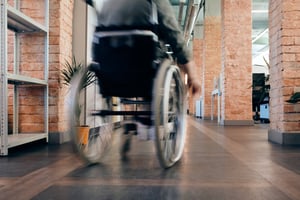Is Home Care Covered By Medicaid? When it comes to receiving essential care and support in the...
What Are Caregiver Classes?
As the population ages, the need for caregivers is growing rapidly. Caregivers are individuals who provide assistance to those who are unable to care for themselves due to age, illness, or disability.
Caregiving can be a rewarding and fulfilling job, but it also requires a great deal of knowledge and skill. That’s why caregiver classes are becoming increasingly popular.

Understanding the Caregiver Classes
Caregiver classes are designed to provide individuals with the knowledge and skills they need to care for others. These classes cover a wide range of topics, from basic caregiving skills to specialized techniques for caring for patients with specific illnesses or disabilities.
They can be taken online or in person and can be tailored to meet the specific needs of the caregiver. One of the most important things that caregiver classes teach is how to provide proper care to patients.
This includes learning about personal care, such as bathing, grooming, and dressing, as well as medical care, such as administering medication and monitoring vital signs. Caregivers also learn about how to provide emotional support to patients, as well as how to communicate effectively with them and their families.
In addition to these basic skills, caregiver classes also cover a variety of specialized topics. For example, some classes focus on caring for patients with Alzheimer’s disease or dementia, while others focus on caring for patients with disabilities.
Some classes also cover topics such as nutrition, exercise, and mental health. Caregiver classes can be beneficial for both professional and informal caregivers.
Professional caregivers, such as nursing assistants and home health aides, are often required to complete a certain number of training hours before they can begin working.
Informal caregivers, such as family members, can benefit from taking caregiver classes to ensure that they are providing the best possible care to their loved ones.
By learning proper caregiving techniques and strategies for managing stress, caregivers can reduce their risk of burnout and provide better care to their patients.
The Importance of Caregiver Classes for Improving Job Opportunities in the Healthcare Field
Caregiver classes not only provide individuals with the knowledge and skills they need to care for others, but they can also improve job opportunities in the healthcare field.
Many employers in the healthcare industry require their employees to complete a certain number of training hours before they can begin working. By completing caregiver classes, individuals can increase their chances of getting hired and advancing in their careers.
In addition, many caregiver classes offer certifications upon completion. These certifications demonstrate to employers that individuals have the necessary skills and knowledge to provide high-quality care. This can be particularly beneficial for those who are looking to transition into a career as a professional caregiver.
Furthermore, taking caregiver classes shows a commitment to personal and professional development. Employers value employees who are committed to ongoing learning and are more likely to promote them into higher positions within the company.
Overall, caregiver classes are an excellent way for individuals to improve their job opportunities in the healthcare field while also gaining valuable knowledge and skills.
The Benefits of Caregiver Classes for Family Members Who are Caring for Loved Ones
Caring for a loved one with a chronic illness can be overwhelming, both emotionally and physically. Family members who take on this role often find themselves feeling stressed, anxious, and isolated.
Caregiver classes can provide much-needed support and resources to help these individuals navigate the challenges of caregiving.
One of the primary benefits of caregiver classes for family caregivers is learning how to provide proper care to their loved ones. These classes cover a wide range of topics related to caregiving, including medical care, personal care, and emotional support.
Family caregivers learn practical skills such as administering medication, monitoring vital signs, and providing assistance with activities of daily living (ADLs). They also learn how to communicate effectively with healthcare providers and advocate for their loved ones.
In addition to these practical skills, caregiver classes also provide emotional support to family caregivers. Caring for a loved one with a chronic illness can be isolating, but caregiver classes offer an opportunity to connect with others who are going through similar experiences.
This sense of community can help reduce feelings of stress and anxiety and improve overall well-being.
Furthermore, caregiver classes can help family caregivers avoid burnout. Burnout is common among family caregivers due to the demands of caregiving combined with other responsibilities such as work and family obligations.
Caregiver classes teach strategies for managing stress and avoiding burnout so that family caregivers can continue providing high-quality care without sacrificing their own health and well-being.
Overall, caregiver classes offer numerous benefits for family members who are caring for loved ones with chronic illnesses. By learning practical skills, gaining emotional support, and avoiding burnout, family caregivers can provide the best possible care while prioritizing their own health and well-being.
Best Practices for Finding and Selecting High-quality Caregiver Training Programs.
When it comes to finding and selecting a high-quality caregiver training program, there are several best practices that individuals should keep in mind. These practices can help ensure that the program they choose is reputable, effective, and meets their specific needs.
Research different programs
The first step in finding a high-quality caregiver training program is to research different options. This can be done by searching online, asking for recommendations from healthcare professionals or other caregivers, or contacting local organizations that provide caregiving services.
By researching multiple programs, individuals can compare the curriculum, cost, and reputation of each one before making a decision.
Look for accreditation
Accreditation is an important factor to consider when choosing a caregiver training program. Accreditation means that the program has met certain quality standards set by an accrediting organization.
In the United States, the National Council for Aging Care (NCAC) is one organization that accredits caregiver training programs. By choosing an accredited program, individuals can have confidence that they are receiving high-quality education and training.
Consider the curriculum
The curriculum of a caregiver training program should cover a wide range of topics related to caregiving. This includes basic skills such as personal care and medical care, as well as specialized techniques for caring for patients with specific illnesses or disabilities.
It’s important to choose a program that covers all of these topics thoroughly and provides hands-on experience in applying these skills.
Check reviews and ratings
Before enrolling in a caregiver training program, it’s important to check reviews and ratings from previous students. This can be done by searching online or contacting the school directly to ask for references.
Reading reviews from other students can provide valuable insights into the quality of education provided by the program.
Consider cost and location
Cost and location are also important factors to consider when choosing a caregiver training program. Programs vary widely in cost depending on the length of the program and the level of certification offered. It’s important to choose a program that fits within your budget and is located in a convenient location for you.
By following these best practices, individuals can find and select high-quality caregiver training programs that meet their specific needs and provide them with the knowledge and skills they need to provide excellent care.
The Role of Continuing Education in Helping Caregivers Stay up-to-date With the Latest Best Practices
Continuing education plays a critical role in ensuring that caregivers are equipped with the latest knowledge and skills needed to provide high-quality care. As the healthcare industry evolves, new best practices and industry trends emerge, making it essential for caregivers to stay up-to-date.
One of the primary benefits of continuing education is that it allows caregivers to learn about new treatments, medications, and technologies.
For example, a caregiver who completed their training several years ago may not be familiar with some of the newer medications that are now available. By taking continuing education courses, they can learn about these new treatments and how to administer them safely and effectively.
Continuing education also helps caregivers stay informed about changes in regulations and laws related to caregiving. These changes can have a significant impact on how caregivers provide care, so it’s important for them to understand these updates thoroughly.
Moreover, continuing education can help caregivers develop specialized skills in areas such as palliative care or end-of-life care. These skills can be invaluable when caring for patients with complex medical conditions or those who are approaching the end of their life.
In addition to these practical benefits, continuing education can also help boost caregiver confidence and job satisfaction. Caregiving can be a challenging profession, but by staying up-to-date with current best practices and emerging trends, caregivers can feel more confident in their abilities.
This increased confidence can lead to greater job satisfaction and a sense of fulfillment from providing high-quality care.
Overall, continuing education is an essential component of professional development for caregivers. It offers numerous benefits such as keeping them informed about new treatments and technologies, helping them develop specialized skills, boosting confidence and job satisfaction, among others.
The Use of Simulation-Based Training
Simulation-based training is a type of education that uses realistic scenarios to teach practical skills and decision-making. In recent years, simulation-based training has become increasingly popular in the healthcare industry, including for caregiver training.
This type of training can be particularly useful for caregivers because it allows them to practice their skills in a safe and controlled environment. One of the primary benefits of simulation-based training for caregivers is that it can help them develop critical thinking and problem-solving skills.
By practicing real-life scenarios, caregivers can learn how to make quick decisions under pressure and respond appropriately to unexpected situations. This can be especially important when caring for patients with complex medical conditions or those who require immediate attention.
Simulation-based training provides an opportunity for caregivers to practice communicating effectively with these professionals and working collaboratively as a team. Another benefit of simulation-based training is that it can improve patient outcomes.
By practicing their skills in a simulated environment, caregivers can identify areas where they need improvement and work to address those gaps before providing care to actual patients. This can lead to better patient outcomes by reducing errors in care delivery.
Overall, simulation-based training is an effective way to enhance caregiver skills and improve patient outcomes.
By providing a safe learning environment where caregivers can practice practical skills, develop critical thinking abilities, improve communication skills, work as a team more effectively among others; they are better equipped to provide high-quality care that meets the needs of patients with different medical conditions or disabilities.
The Role of Caregiver Education in Promoting Patient Safety and Preventing Medical Errors.
Patient safety is a critical aspect of caregiving, and it’s essential for caregivers to have the necessary knowledge and skills to prevent medical errors. Proper caregiver education can play a significant role in promoting patient safety and reducing the risk of medical errors.
One way that caregiver education can promote patient safety is by teaching proper infection control techniques. Caregivers who are not trained in proper infection control can inadvertently spread infections, which can be particularly dangerous for patients with weakened immune systems.
By learning how to properly wash their hands, use personal protective equipment (PPE), and disinfect surfaces, caregivers can reduce the risk of infection transmission.
In addition to infection control, caregiver education can also teach important medication management skills. Medication errors are a common cause of adverse events among patients, so it’s essential for caregivers to understand how to administer medication safely and accurately.
Caregiver education programs cover topics such as medication administration routes, dosage calculations, and side effect monitoring.
Another way that caregiver education promotes patient safety is by teaching proper transfer techniques. Patients who require assistance with mobility are at risk of falls or other injuries if they are not transferred properly.
Caregiver education programs teach safe transfer techniques such as using assistive devices like gait belts or transfer boards.
Overall, caregiver education plays a crucial role in promoting patient safety and reducing the risk of medical errors. By teaching proper infection control techniques, medication management skills, transfer techniques among others; caregivers are better equipped to provide high-quality care that prioritizes patient safety above all else.
Summary
In conclusion, caregiver classes are an important resource for anyone who is responsible for the care of another person. These classes provide caregivers with the knowledge and skills they need to provide proper care, reduce their risk of burnout, and improve the overall quality of care they provide.
Whether you are a professional caregiver or an informal caregiver, taking caregiver classes can help you become a better caregiver and provide better care to those who need it.


